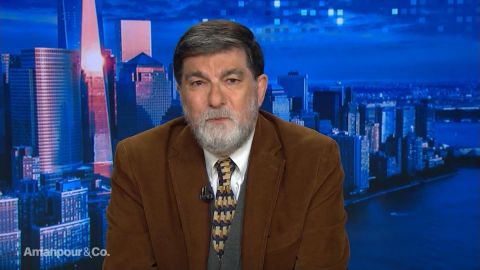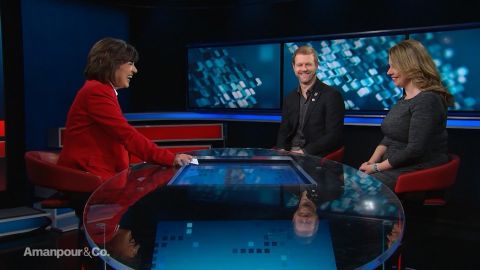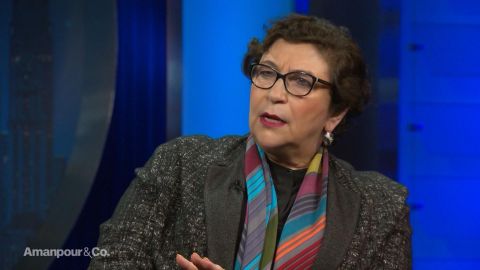Read Transcript EXPAND
CHRISTIANE AMANPOUR: You yourself have been at the table under the Clinton administration on this very difficult issue. What should we expect from a U.S. point of view and a North Korean point of view denuclearization to mean?
CARLIN: We want to see the North Koreans cap their program, stop producing more material to make bombs, then we want to see them begin to dismantle it. The North Koreans haven’t committed to do anything yet but they’ve started the process, at least, on capping the lethality of the program. That’s pretty important. The next steps are what they’re going to ask of us and we’re not sure, they haven’t really put things on the table.
AMANPOUR: So, when you say it’s a pretty big deal that they’ve sort of capped the lethality of their equipment, do you mean, specifically, that they have not continued to test and improve the delivery systems, that they have not continued to test the nuclear devices? Is that what you specifically mean?
CARLIN: That’s exactly right. If they don’t test any more, they probably can’t perfect a hydrogen weapon. A hydrogen with weapon is significantly more destructive than a normal atom bomb and we don’t want them to get to that stage.
AMANPOUR: What do you think is the logical expectation from this next round of summitry? We already know the two principals, the leaders, have developed what appears to be a fairly decent personal relationship. What has to happen out of this summit to indicate that something is moving, the ball is moving down the field?
CARLIN: We’re in a little bit of a pickle that we’ve put ourselves in. That is, in the normal process of negotiations, you don’t have to have a deliverable at the end of every meeting. Things develop in the meetings over time, you make progress but you don’t have a final outcome at the end of each meeting. And so, you have chance — you have a chance for ideas to sort of grow and compromises to be reached. Since we’re at the summit and because of the political pressures, there’s really a — as you know, there’s a big, big push that something has to come out of this meeting, something concrete. Well, what would naturally emerge, given the fact that we really haven’t had that many meetings and we haven’t had a chance to chew over these things or poke and prod at the different options. The most likely things, it seems to me, are the easiest, which is what we should be attacked — we should be tackling right away anyway, possibility of an end of war declaration are some wording to that effect. That’s important. It addresses one of the three things that the Singapore summit had listed. The possibility of some sort of sanctions relief moderating. I don’t know how we’re going to phrase it. We’re not going to say we’re lifting sanctions, but is there some way to tweak it.
AMANPOUR: I want to ask you to explore the meaningfulness of what Kim Jong-un has already done. Well, we’ve talked about the freeze on nuclear testing and ballistic missile testing. We saw that just before the last summit, they blew up some tunnels that were meant to be their testing areas. How much has he done and how much of that is verifiable and how much has the U.S. done in return?
CARLIN: Kim pledged in April of last year that they would have no more nuclear or long-range missile tests. That’s very easy to monitor with our technical platforms and they haven’t done either. That’s important. Again, because of lethality of the program. Has also put on the table the possibility of allowing us Yongbyon and dismantling it, disabling it then dismantling it. That’s a pretty important step. I know some people toss that off as unimportant because they say Yongbyon is an old facility, it isn’t worth anything. I beg to differ. Yongbyon is the only place they produce plutonium and another component of a hydrogen weapon, tritium. If Yongbyon is shutdown, they can’t produce either one. That’s very important. People say, “Well, they’ve got another enrichment facility somewhere in the country.” Yes, they probably do and eventually we’re going to have to get to it. But if we don’t get to it right away and yet we do shut down the enrichment facility in Yongbyon, that’s very important, that’s progress. We’re not going to get the final prize right away. We need to move towards it and we need to be realistic in what we can get and what we should be satisfied helps protect the national security interests.
AMANPOUR: So, you’ve been, as I say, at the table, you’ve been in these close negotiations under the Clinton administration, you obviously watch what’s been going on since. President Trump, you know, talked to Kim Jong- un about the possibilities of an economic revival in his country if he changed his ways. He said that he believes that Kim Jong-un, you know, was interested in that. There are two questions. I’m going to play President — let me first play President Trump’s soundbite on this and we’ll talk about that.
(BEGIN VIDEO CLIP)
DONALD TRUMP, U.S. PRESIDENT: I really believe that North Korea can be a tremendous economic power when this is solved. Their location between Russia, China and South Korea is unbelievable. I think that North Korea and Chairman Kim have some very positive things in mind and we’ll soon find out.
(END VIDEO CLIP)
AMANPOUR: So, what is your assessment of how much the economic and the future sort of prizes dangling out there means to Kim Jong-un versus what others in the intelligence assess and that is nothing is more important than regime survival and for that, they need to keep their nuclear options on the table?
CARLIN: Two points. To address the second thing that you raise. The Intelligence Community is making a judgment. They don’t know that. It’s a judgment that they’re making based on what they think is a lot of pieces of paper that cross their desk. I don’t necessarily know that that’s true. What I do know is that we have evidence Kim Jong-un has been working on his economy from the day he took over. He has new ideas. He won’t — he’ll — I doubt if he’ll ever use the term reform but he’s been making big changes in order to revive the economy. And I think that beginning in last year when he announced that the new strategic line is everything for the economy is something that he’s been adhering to and therefore, it feeds into the negotiations with the U.S. It isn’t as if the Trump administration suddenly invented this, this is a door that the North Koreans have unlocked and opened up for us to explore, to see how far we can use progress in that area to get the things that we want in the area of denuclearization.
About This Episode EXPAND
Christiane Amanpour speaks with Robert Carlin about President Trump and Kim Jong-un’s second summit; and David Hein & Irene Sankoff about their musical “Come From Away.” Michel Martin speaks with Yevgennia Albats, Chief Editor of The New Times, about what it’s like to criticize the Kremlin as a Russian reporter.
LEARN MORE


